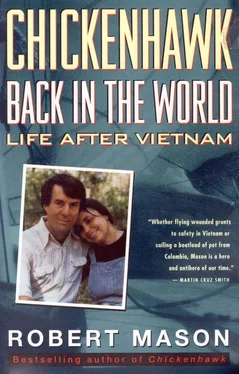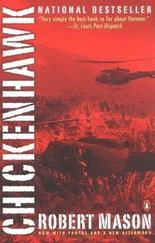Robert Mason - Chickenhawk - Back in the World - Life After Vietnam
Здесь есть возможность читать онлайн «Robert Mason - Chickenhawk - Back in the World - Life After Vietnam» весь текст электронной книги совершенно бесплатно (целиком полную версию без сокращений). В некоторых случаях можно слушать аудио, скачать через торрент в формате fb2 и присутствует краткое содержание. Год выпуска: 2013, Издательство: BookBaby, Жанр: Старинная литература, на английском языке. Описание произведения, (предисловие) а так же отзывы посетителей доступны на портале библиотеки ЛибКат.
- Название:Chickenhawk: Back in the World - Life After Vietnam
- Автор:
- Издательство:BookBaby
- Жанр:
- Год:2013
- ISBN:нет данных
- Рейтинг книги:3 / 5. Голосов: 1
-
Избранное:Добавить в избранное
- Отзывы:
-
Ваша оценка:
- 60
- 1
- 2
- 3
- 4
- 5
Chickenhawk: Back in the World - Life After Vietnam: краткое содержание, описание и аннотация
Предлагаем к чтению аннотацию, описание, краткое содержание или предисловие (зависит от того, что написал сам автор книги «Chickenhawk: Back in the World - Life After Vietnam»). Если вы не нашли необходимую информацию о книге — напишите в комментариях, мы постараемся отыскать её.
Chickenhawk: Back in the World - Life After Vietnam — читать онлайн бесплатно полную книгу (весь текст) целиком
Ниже представлен текст книги, разбитый по страницам. Система сохранения места последней прочитанной страницы, позволяет с удобством читать онлайн бесплатно книгу «Chickenhawk: Back in the World - Life After Vietnam», без необходимости каждый раз заново искать на чём Вы остановились. Поставьте закладку, и сможете в любой момент перейти на страницу, на которой закончили чтение.
Интервал:
Закладка:
When we checked in, John and I had deposited a hundred dollars into our inmate commissary account. We were eager to spend some of it on essentials like soap and cigarettes. We got in line. After about a half hour, we got to the steps of the wooden porch at the front of the commissary building. A sign on the wall listed what you could buy and next to the sign was a box of order slips. You had to fill out the order slip before you got inside. The commissary was like a convenience store except you had to wait in line and clerks got the stuff for you. I studied the list. You could buy soap, soap dishes, combs, cigarettes, cigars, baby oil, soda, candy, shower shoes, towels, tennis balls, handballs, sweatshirts, T-shirts, fresh fruit, portable radios, watches, ice cream, and lots more. The list had a note attached that said special orders for tennis shoes, running shoes, baseball gloves and shoes, table tennis rackets, shorts, and tennis rackets were taken only at the commissary office between eleven and twelve, weekdays.
I decided to buy a watch. They’d taken my old Seiko when I checked in because they said it was too valuable. I’d bought it on my R&R in Hong Kong for five dollars, eighteen years before.
“Yeah,” John said. “Me, too. A watch, some Jif peanut butter, some Ritz crackers. Need a bunch of stuff.”
We filled out our lists and went inside. By the door was a counter closed off with a Plexiglas panel. You slipped your list through a slot. One of two inmates who worked there would grab it and start loading up a plastic bin with whatever you had on your list. They were both fast. They put your bin in a queue that they shoved along the counter until it stopped next to the cashier. The cashier was Miss Reed, a nice-looking blond woman who ran the commissary. They called her Lady-hack. She looked like most any other clerk you’ve seen in a convenience store except that she was attractive even wearing the blue Bureau of Prisons uniform. Miss Reed pulled inmate account cards from a portable file drawer and put them in her register. She totaled up the order as the other inmate clerk shoved the stuff through a hole. Bananas and socks and soap tumbled down a chute for the inmate customer to bag. The purchase amount was deducted from the account card. Miss Reed looked for John’s account card and shook her head. One of the inmates, called Grumbles because of his gravelly voice, said, “You don’t have an account yet.”
“What d’you mean?” John said. “I gave them a hundred bucks. Cash.”
Grumbles shrugged knowingly. “I’m sure. But the assholes haven’t made you an account card yet. You’ll have one by Monday. Try then.” Grumbles turned around with John’s bin and restocked the stuff in it in about ten seconds. I told him I was in the same boat, and we walked outside.
On the way, we passed the camp chapel. Inside, we saw men singing. A choir of prisoners. The chapel was a refuge for many, and I think it was good that they provided one. In keeping with the cynical spirit of prison, people who did not go to chapel called those that did “kneel and squealers.”
We were back at our bunks for the ten o’clock count.
I sat on my bunk after the count and just watched. I was feeling sad.
At forty-one, I was feeling the same homesickness I’d felt as a teenage college student away from home the first time. I was a stranger in a strange place. Doc, the man next to me, was reading the Bible. Doc had told me earlier that he was a physician (family practice). Doc believed that the federal income tax was unconstitutional. Protesting this illegal tax, Doc didn’t pay his for several years. He got two years, proving that having a medical degree doesn’t necessarily mean a person is smart.
Barnett, the guy in the bunk above me, was telling an inmate how to appeal his case. Barnett was an attorney from Atlanta. Jailhouse lawyers, I am told, are common. At Eglin, though, most of them were actually attorneys. Across the aisle, Lauder was reading my book. I nodded at a wild-looking man next to Lauder who was staring at me. He had hollow eyes, long stringy black hair, and looked about fifty pounds underweight. He nodded back and came over to my bunk. He sat on Doc’s bed, ignoring Doc. Doc glanced up, made a small sneer, and looked back to his Bible.
“You wrote that book?” the rangy-looking inmate asked.
“Yeah. I did.”
“That’s great,” he said. He smiled. “My name’s Fred. Fred Devito.”
“Bob Mason. Pleased to meet you, Fred.”
“I’m trying to teach myself how to write. You know, learn something useful while I’m here besides how to spear trash.”
“That’s great,” I said. “That’s your job? Spearing trash?”
Devito nodded. “That’s what they’ve got me doing now, during this two-week A&O (admissions and orientation) bullshit. I walk around with a bucket and a stick with a nail on the end. I pick up cigarette butts and stuff all day. Not a bad job, really. You’d be smart if you could get it tomorrow.”
“Tomorrow?”
“Yeah. First three weeks you’re here, before they assign you your regular job? You’re an A&O. They have you washing floors, cleaning latrines, digging ditches, shit like that—seven days a week.”
“You’re kidding.”
“Yeah, sure, I’m kidding. Wait until tomorrow. Unless you got a visitor, you’ll be fucking working.”
“I do,” I said. “My wife’s coining.”
“Lucky,” Fred said. “They’ll call you out of your work detail when she shows up.”
“Man,” I said. “I had this image, you know? Me with a typewriter in some lonely cell, typing away. Like in the movies.”
“Yeah,” Fred said. “You have to go to places like the one I just got out of to do that. These camps are all work camps. Everybody works. In a real prison, it’s a big deal to get a job. Mostly you hang out in your cell jerking off and smoking pot. Actually,” Fred said, “I didn’t mind it too much.”
“Why’d they send you here?”
“They send some of us to places like this when we get close to getting out. Kind of a transition zone, I guess. I’ll be outa here in six months. How long you in for?”
“I was sentenced to five years,” I said, not believing it was me speaking. “Pot smuggling.”
“How much pot you have?” Fred asked.
“Three thousand pounds.”
“You’ll do two,” Fred said.
“You think so?”
“Yeah. You’ll see. You go before the parole board in a month or so. They have guidelines set up according to how much stuff you brought in. Three thousand pounds will get you two years.”
Two years. I looked around the room. The huge fan near our end of the room was buzzing loudly, swirling hot, humid air around the crowded room. Groups of men chattered around bunks and more talked in groups out on the porch. The noise was incredible. There was absolutely no privacy. Two years of this? “How long you been in jail so far, Fred?”
“When I leave, it’ll be five years.”
“Damn.”
“Yep,” Fred said, looking distracted. “Bob. About this writing. I was wondering. You think you could look at something I wrote?”
“Sure, where is it?”
“It’s still kinda rough, you know?” Fred said. “Maybe I’ll have it ready tomorrow.”
The showers closed at eleven. I stripped down, wrapped a towel around myself, and walked down the hall. The bathroom was like the ones you see in school locker rooms and in basic training in the Army, public showers and a long row of stalls with commodes. You showered with up to six other men. They had put doors on the toilet stalls, the only concession they’d made for privacy. I showered. I’d forgotten to bring shower shoes. I could feel colonies of foot fungus migrating through the pores in my skin and under my toenails. I dried off and walked back to my bunk and dressed.
Читать дальшеИнтервал:
Закладка:
Похожие книги на «Chickenhawk: Back in the World - Life After Vietnam»
Представляем Вашему вниманию похожие книги на «Chickenhawk: Back in the World - Life After Vietnam» списком для выбора. Мы отобрали схожую по названию и смыслу литературу в надежде предоставить читателям больше вариантов отыскать новые, интересные, ещё непрочитанные произведения.
Обсуждение, отзывы о книге «Chickenhawk: Back in the World - Life After Vietnam» и просто собственные мнения читателей. Оставьте ваши комментарии, напишите, что Вы думаете о произведении, его смысле или главных героях. Укажите что конкретно понравилось, а что нет, и почему Вы так считаете.












